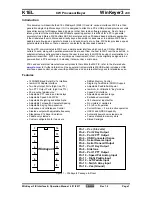
18/90
User manual SCAIME:
NU-Soft-eNod4F-E-0716_235704-C.doc
-
Data : de 8 à 64 bits
For each byte, the most significant bit (MSB) is transmitted first.
-
Cyclic Redundancy Check (CRC) : 16 bits
The result of the CRC calculation is made up of 15 bits that guarantee the integrity of the
transmitted message. The last bit is used to delimit the field and always is transmitted as
dominant.
-
Acknowledgement (ACK) : 2 bits
During two bus clock periods, the bus is available for acknowledgement of the message. All
the nodes that received the message without error generate a dominant bit. Else, an error
frame is generated. The second bit is always recessive.
-
End of frame (EOF) : 7 bits
The end of the frame is represented by a sequence of 7 consecutive recessive bits.
The CANopen® layer defines particularly the content of the arbitration and the control fields and the data field
structure.
5.4
Messages transfers hierarchy
CANopen® is a communication protocol especially dedicated to industrial applications. It allows connecting up to 127
different devices on a same bus giving them the possibility to access the bus at any time. Simultaneous emissions are
managed by an arbitration system that uses priority levels.
This control hierarchy of data transfers guarantees that there is no frame collision on the bus while ensuring a high
level of reliability in communications. The low priority messages are cancelled and reissued after a delay.
The protocol defines several message types characterized by their COB-ID (Communication Object Identifier) that
determines the message priority level. The COB-ID is composed of a function code and the node identifier (between 1
and 127).
The node identifier is the device’s address
on the network. The function code specifies the priority and the purpose of
the message.
Assignment of a particular identifier to each device connected to the bus is mandatory.
eNod4
supports 6 different message types :
CANopen® messages
COB-ID (hex)
NMT
0
SYNC
80
EMCY
81-FF
TPDO1
181
–
1FF
RPDO1
201
–
280
RPDO2
301
–
380
RPDO3
401
–
480
▪
read/write requests :
SDO
(Service Data Object)
▪
real time transfers :
PDO
(Process Data Object)
▪
nodes state management :
NMT
(Network Management)
▪
warnings :
EMCY
(Emergency)
▪
synchronization events :
SYNC
(Synchronization)
▪
node status indications :
Boot-up
/
Heartbeat
and
Node guarding
▪
















































